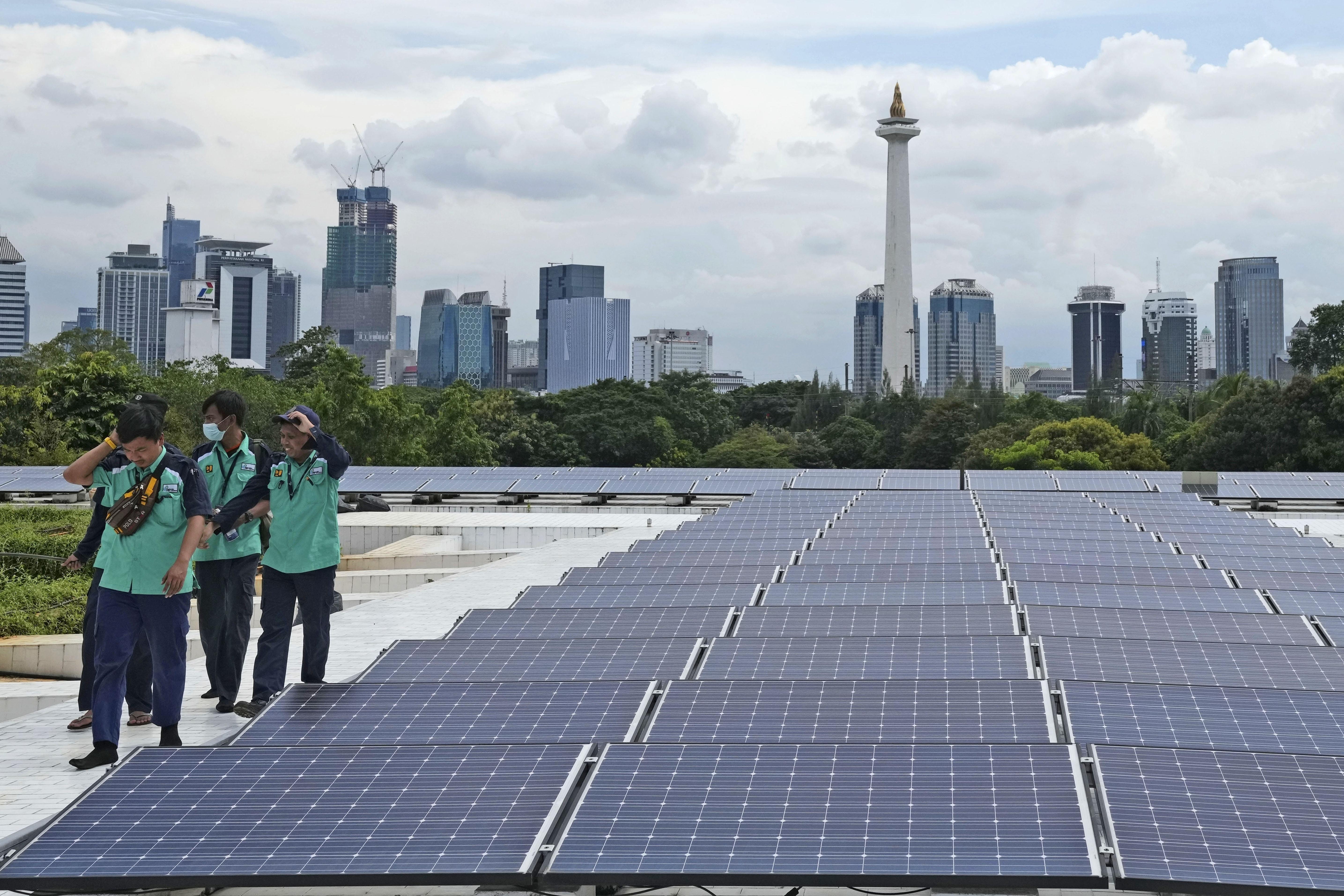 Workers walk near solar panels that provide partial electrical power to Istiqlal Mosque as the city skyline is seen in the background, in Jakarta, Indonesia, March 29, 2023. (PHOTO / AP)
Workers walk near solar panels that provide partial electrical power to Istiqlal Mosque as the city skyline is seen in the background, in Jakarta, Indonesia, March 29, 2023. (PHOTO / AP)
China can play a key role in Indonesia’s clean energy transition, providing the financing and technology needed to make the shift from coal power to renewable energy, experts said.
Such assistance is urgent as Indonesia, which is among the world’s highest carbon emitters, released a draft investment plan on Oct 31 that listed priority projects to help hit net zero emissions in the power sector by 2050. The Indonesian government is inviting the public to send feedback on the Comprehensive Investment and Policy Plan until Nov 14.
The move comes under the Indonesia Just Energy Transition Partnership, an agreement to mobilize $20 billion in public and private financing to support the country’s move to green energy.
The JETP was signed on Nov 15, 2022, at the G20 Leaders’ Summit in Bali between Indonesian President Joko Widodo and the International Partners Group led by the United States and Japan. Other IPG members include France and Germany.
CIPP projects include the early retirement of coal-fired power plants, the deployment of transmission lines and power grids, and the enhancement of the renewable energy value chain.
China can provide “competitive funding” for projects listed under the CIPP, it can also help Indonesia improve its supply chain for renewables, said Putra Adhiguna, energy technologies research lead for Asia at the Institute for Energy Economics and Financial Analysis
China can provide “competitive funding” for projects listed under the CIPP, said Putra Adhiguna, energy technologies research lead for Asia at the Institute for Energy Economics and Financial Analysis.
Apart from financial assistance, Adhiguna said China can help Indonesia improve its supply chain for renewables.
“China is in the best position to do that, given that many solar power (panels) and batteries (are produced in) China,” he said.
According to the CIPP document, Indonesia needs at least $96.1 billion between 2023 and 2030 to finance projects that would help transition to clean energy generation.
Money is always an issue in facilitating the shift towards renewable energy generation, according to Fabby Tumiwa, executive director of the Institute for Essential Services Reform think tank in Jakarta.
ALSO READ: Indonesia publishes energy transition plan for G7 funding
Citing the estimates made in the CIPP document, Tumiwa said that despite the funding promised by JETP, a financing gap of more than $70 billion still needs to be filled to wean Indonesia away from coal power.
Indonesia is among the world's biggest coal producers and exporters, with coal accounting for roughly 60 percent of domestic electricity generation.
Tumiwa said China and other institutions like the World Bank can help close the financing gap for Indonesia’s energy transition.
More than money, China, as the world’s manufacturer of renewable energy equipment, can provide the technical expertise that Indonesia needs to generate its own green energy, he said.
“Technology is quite central in (Indonesia’s) cooperation with China,” Tumiwa said.
Even before the release of the CIPP, China has been involved in Indonesia’s clean energy initiatives.
On Nov 9, Widodo inaugurated a floating solar plant jointly funded by Indonesia’s state utility firm PLN and the Abu Dhabi-based energy company Masdar, and constructed by PowerChina Huadong Engineering Corporation Ltd.
The 250-hectare plant, located on the Cirata Reservoir in the province of West Java, is the largest floating solar plant in Southeast Asia and can produce 300 million kilowatt hours of energy per year.
Analysts said the CIPP – and Indonesia’s move towards clean energy – is not only important for Southeast Asia’s biggest economy but also has implications for all signatories of the Paris Agreement.
The pact, which was signed by 196 parties at the United Nations Climate Change Conference (COP21) in 2015, seeks to limit emissions and keep the global temperature rise below 2 C.
READ MORE: Indonesia president breaks ground on airport in new capital
The climate agreement will be in focus in the coming weeks as the international community convenes for the 28th session of the UN Climate Change Conference (COP28) from Nov 30 to Dec 13 in Dubai, the United Arab Emirates.
Adhiguna of the IEEFA said that publishing the CIPP has shown how a major coal exporter like Indonesia can shift to clean energy.
“If this can happen in Indonesia, it could probably be adopted elsewhere,” he said.
For Tumiwa of the IESR, the CIPP attests to Indonesia’s seriousness in cutting emissions despite challenges.
Beyond funding concerns, he said Indonesia cannot just suddenly halt the construction of new coal plants that were contracted more than five years ago.
“But the government tried to make the best of the situation,” Tumiwa added.
Leonardus Jegho in Jakarta and Xinhua contributed to this story.
Contact the writer at prime@chinadailyapac.com


